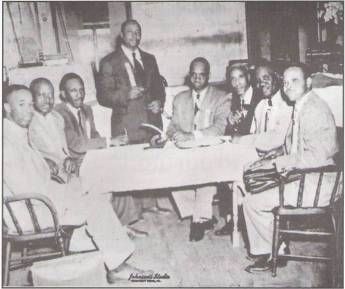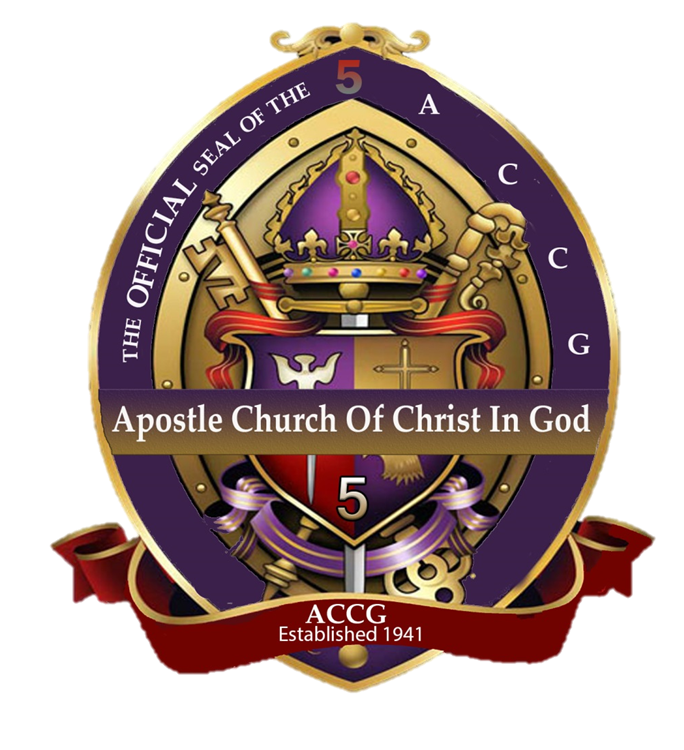ACCG CHRONICLES

ACCG FOUNDERS
Elder J.C. Richardson, Sr.. Elder J.W. Ardrey, Elder J.M. Williams, Elder J.J. Jenkins, Elder W.R. Bryant (1940)
A Legacy of Faith, Fellowship, and Apostolic Vision
In 1940, five devoted ministers prayerfully considered whether to establish a new apostolic organization or affiliate with an existing body. Unfamiliar with other apostolic groups, they chose to seek divine direction. Through a series of prayer meetings, discussions, and planning sessions, the vision for a new fellowship was born.
In May 1941, the Apostle Church of Christ in God (ACCG) held its first convention in Winston-Salem, North Carolina. The founding ministers—Elder J.C. Richardson, Elder J.W. Ardrey, Elder J.M. Williams, Elder J.J. Jenkins, and Elder W.R. Bryant—established churches in Winston-Salem (headquarters at 5 Greenwood Ave.), Martinsville, VA, and Rudd, NC. Elder J.W. Ardrey, the senior among them, was appointed the first Presiding Bishop. Soon after, Elder Walter J. Jackson joined their ranks, bringing wisdom and experience from his time with Bishop Faison.
Growth and Expansion
As the ACCG began to grow, Elder R.O. Doub was appointed State Overseer of Pennsylvania, and Elder Melvin Jones took on the same role in New York. The ministry expanded throughout Virginia and North Carolina, prompting the need for additional leadership. At the 1952 Annual Convocation in Newport News, VA, Elder J.C. Richardson, Sr. was consecrated as Bishop. By 1956, he became the Presiding Bishop, faithfully serving until his homegoing on March 2, 1995.
Bishop Richardson’s leadership ushered in a season of remarkable growth. A native of South Carolina and a man of prayer and fasting, he relied wholly on the Lord Jesus Christ. Under his guidance, the ACCG welcomed churches across Virginia, North Carolina, South Carolina, Georgia, Washington, DC, Maryland, Delaware, New Jersey, Ohio, Florida, Pennsylvania, New York, and Connecticut.
Ministries and Milestones
During Bishop Richardson’s tenure, numerous auxiliaries and initiatives were established, including:
- The Apostolic Journal (official publication)
- The Educational Fund
- The Young People’s Apostolic Association (YPAA)
- Senior and Junior Missionary Departments
- Deacons/Brothers Association
- National Usher Board
- Minister of Music and National Music Department
- Annual Award Recognition Service for academic achievement
Apostolic Leadership Across the Nation
The 1950s and 1960s saw the rise of many pastors and ministers, including Bishop Cotten, Elder Cotton, Bishop Eli Daniel, Bishop Ulysses McCall, Bishop O.D. LeGrant, Elder Webster, Elder Pickett, Bishop S.E. Saunders, Bishop Joseph Wiley, Elder Joseph Acker, and Elder F.D. Robinson in the Carolinas.
In Virginia and northern states, leaders included Bishop R.B. Fuller, Bishop J.R. Ziglar, Bishop Robert Kellam, Bishop Leroy Robinson, Elder Higgs, Elder Albert Hairston, Elder David Fuller, Bishop Claude Lovelace, Bishop Tilman Carmichael, Bishop W.L. Pye, Bishop E.E. Everett, Bishop Ernest Hairston, Bishop George Wiley, and Elder Samuel Moorman.
By the end of the 1960s, ACCG was poised to transition from a regional body to a national church. The 1970 Annual Convocation was widely regarded as one of the most unified and spiritually impactful gatherings. However, like many apostolic organizations, ACCG experienced a split shortly thereafter.
Continued Blessings and New Beginnings
Despite the challenges, the Lord continued to bless ACCG. Since 1971, many pastors and ministers have joined the fellowship, including Bishop Jeremiah Jefferson (Washington, DC), Bishop Elihu Cartledge (Clinton, MD), Bishop C.L. White, Elder Williams (Winston-Salem, NC), Pastor Arenn Wynn (Youngstown, OH), Chaplain James Brooks (U.S. Air Force), Elder Ashley Brown (Washington, DC), Elder James Benton, Elder Benjamin Joyner (Eastern NC), Bishop C.R. Washington, Elder Johnny Hayes, Bishop L.O. Lucas, Elder Daniel Wilson, and Elder Gary Johnson.
New congregations were organized by Elder Roosevelt Watson (Zebulon, NC), Bishop J.P. Lowery (St. Matthew Church, Winston-Salem, NC), Elder J.N. Gravely Jr. (New Jerusalem Church, Leatherwood, VA), Elder R.M. Ford (Solid Rock Church, Mt. Rainer, MD), Elder Rufus Hayes (South Boston, VA), Elder Leroy McGhee (Heavenly Host Church, Winston-Salem, NC), Pastor P.H. Motley (Grace Chapel Church, Fieldale, VA), Elder L.A. McBryde (Goshen Church, Capitol Heights, MD), and Bishop Robert Gaston (New Life Churches, NC & SC).
Existing congregations were also welcomed into the ACCG, including Elder Dennis Jefferson (Pentecostal Evangelical Church, Palmer Park, MD), Elder Eddie Cherry (Church of the First Born, Salisbury, MD), Elder William Wiley (Mt. Calvary Church, Goldsboro & Middlesex, NC), and Bishop Leroy Robinson (Tabernacle Church, Newport News, VA).
Transitions and Tributes
Pastoral transitions included Bishop H.W. Betts (St. Luke Church, South Boston, VA), Elder H.E. Milner (St. John Church, Winston-Salem, NC), Elder Robert Conward (St. James Church, Washington, DC), Elder Carl T. Motley Jr. (Bethlehem Church, Winston-Salem, NC), and Bishop J.C. Richardson Jr. (Mt. Sinai Church, Martinsville, VA).
The ACCG has also mourned the loss of beloved leaders. In October 1990, Bishop Leroy Robinson—Chairman of the Convocation Finance Committee and pastor of Tabernacle Apostolic Church—was called home. In January 1991, Bishop Walter J. Jackson, Vice Bishop and pastor of Bethlehem Apostle Church, entered eternal rest. A man of prayer and integrity, Bishop Jackson’s steadying presence remains deeply missed.
The most profound loss came in March 1995, when our Presiding Bishop, Dr. J.C. Richardson, Sr., went home to be with the Lord. His legacy of teaching, humor, love, and spiritual depth continues to guide us. “Bishop, we shall keep in the forefront of our minds the doctrine you taught and the principles for which you stood. And we shall see you in the morning.”
Looking Ahead
As we entered the 20th century, the ACCG remained committed to the path laid before us—a path of prayer, fasting, and unwavering faith in the Lord Jesus Christ.
Few knew that Bishop Richardson had engaged in serious discussions with the Presiding Bishops of four other apostolic organizations, exploring the possibility of a merger to strengthen the work of the Lord. Though the vision was not realized, we continue to pray that unity and collaboration remain at the heart of our mission.
